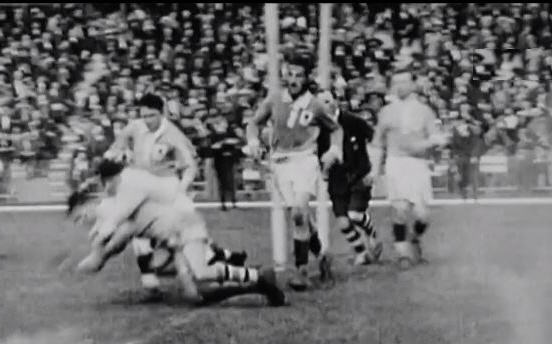Who are the greatest American rugby players to have played for the US Eagles?
Who had the greatest skills? Who contributed the most to American rugby?
Let’s start with the sixth greatest player and work our way up to the top.
Cut Off Point For Our Choices Of Greatest U.S. Rugby Players
We ruled out players who are still playing professional rugby.
Current players like AJ McGinty and Samu Manoa may displace someone from our list. But we’ll only decide on that once they’ve retired.
Number #6: Mike MacDonald (Prop)
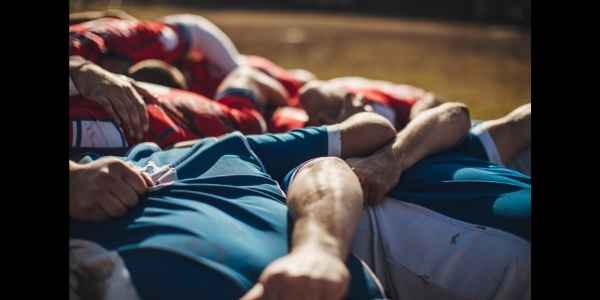
When Mike MacDonald took the field in a 2011 World Cup pool game against Russia, he became the highest capped U.S. rugby player in history.
The Eagles memorably won that match, and MacDonald was awarded the man-of-the-match. Props rarely get the accolades over the flashy backs, but MacDonald led the front row in a demolition of the Russian scrum.
That was MacDonald’s last of three World Cups.
He started playing rugby in high school in California and was also an excellent wrestler. Those wrestling skills were put to good use throughout his rugby career, and he was a feared competitor at rucks.
After university, MacDonald moved to England in 2005 and played one season with the Worcester Warriors. He switched to Leeds where he was a key player for six seasons.
MacDonald was instrumental in Leeds gaining promotion into the Premiership in 2007, the elite level of English rugby.
He was so valued at Leeds that he was named player of the year in 2008, and captain of the team in the following season.
Number #5: Mike Hercus (Flyhalf)
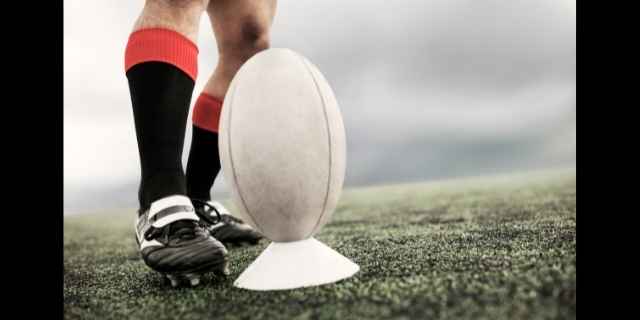
Mike Hercus was born in the U.S. in 1979, but his Australian parents returned to North Sydney when he was a young boy.
He played international underage rugby for the Australian schoolboys’ team and went on to the Under 21s side.
The young flyhalf moved back to the United States with his sights set on playing for the Eagles. It took him just a year at club level to be selected for the national squad.
The U.S. had gone through a poor period, and Hercus was instrumental in their uptick in performances. He played a wily running game with deft offloads to his flankers and centers.
Just as importantly, he was an outstanding placekicker. His Eagles career spans eight years, during which he racked up a stunning 465 points.
Achievements – player and captain
The 2003 World Cup saw his most outstanding achievement at international level. Hercus captained the Eagles to a fine 39-26 pool win against Japan. The team also lost to Fiji by one point.
Hercus moved overseas and was the first-choice flyhalf for the Scarlets in 2005. He steered the Welsh team to a cup final in the summer of 2006.
That year, Hercus was also selected for the Barbarians, the famous invitational team.
I’ve mentioned the great American team try scored by Ngwenya in the 2007 World Cup.
Hercus is the man who races down the field in a support line to take a short pass from a forward. He fires a long wide pass from left to right as the “try-assist” to the speedster.
Number #4: Takudzwa Ngwenya (Winger)
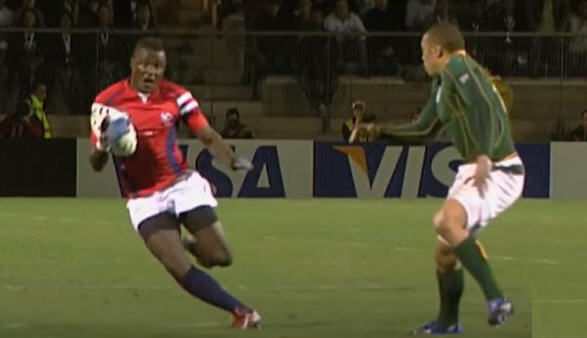
Takudzwa Ngwenya moved from Zimbabwe to Dallas as a teenager and joined a youth rugby team, the Piano Rugby Club.
DARC, one of the top Dallas amateur clubs, spotted his abilities and plucked him to play with their senior side for several seasons.
After playing Sevens rugby, Ngwenya was selected for the U.S. Eagles squad for the 2007 Rugby World Cup. It was there that the rugby world sat up and took notice of the long-legged speedster.
In our article on “juking” in rugby, we describe how Ngwenya likes to shift weight in full stride to bamboozle opponents.
At the World Cup, he bamboozled none other than Bryan Habana, one of the greatest wingers of all time. This clip shows one of the best team tries scored in the history of the World Cup.
And the commentary is priceless.
“He’s got the ball now, Ngwenya, over the ten-meter line, outside Habana.
Wave bye-bye boys. He’s over for the score!
On the back of his World Cup exploits, Ngwenya joined Biarritz in France. In a nine-season stint at the top French side, he racked up many tries. Here are some of his numbers:
- 8 tries in the 2008 Top 14
- 10 tries in the 2009 Top 14
- 6 tries in the 2010 European Cup (joint 2nd top scorer)
- 7 tries in the 2011 European Cup (joint 2nd top scorer)
Number #3: Chris Wyles (Fullback, Winger)
Chris Wyles was born in Connecticut to two English parents who returned to the United Kingdom when he was a schoolboy.
When he played in the English Premiership in the 2006/2007 season, he was spotted by the USA national coaches. They selected him for both the sevens squad and the fifteen-man team that went to the World Cup in 2007.
Wyles was in excellent form in 2007 and backed up those performances four years later at the 2011 World Cup where he was the top American try-scorer.
It’s fair to say that it can be difficult for American players to stand out at a World Cup when they’re up against the top teams.
So, how would Wyles do if he was playing for a top English club side? Let’s get into it.
Achievements in England
Chris Wyles stood out in the traditional home of rugby. He joined Saracens in 2008 and played for ten seasons with this big club.
He was a vital part of their run to the 2010 Premiership title.
Three years later, he scored a try in the Premiership final as his team beat Bath. He had racked up twelve tries that season and was joint second try-scorer in the competition.
Saracens are one of the most formidable English clubs in the last decade. Wyles doubled up on his exploits by scoring a try in the 2016 Premiership final. Once again, he was a title winner.
But so far, Wyles had only scored one try in these finals. He decided to do better by scoring two in the final in 2018 to win the title.
And he didn’t just carve up the field in England. Wyles won two European championships by beating the top clubs in France, the United Kingdom, and Ireland.
Number #2: Todd Clever (flanker)

We debated long and hard as to whether Todd Clever is the greatest American rugby player in history. He’s close, but not quite there.
Early history
Todd Clever was born in California in 1983 and played college rugby at the University of Nevada.
He got his first senior international cap in 2003 when he was just twenty years old. Although he was brought to the 2003 Rugby World Cup, he didn’t play a test match.
The coaches considered him too green but had their eyes on his future. They wanted him to soak up the experience.
Clever had become a vital part of the team by 2005 when he played a barnstorming match in a tight 20-19 win over Canada.
Southern Hemisphere
Clever was still learning his trade when he set off overseas. Most American players who travel tend to go to Europe. But the 23-year-old Clever wanted the challenge of the Southern Hemisphere.
What would New Zealand make of the long-haired American flanker? North Harbour, a renowned amateur Kiwi club, embraced the hard-nosed forward who played a tough game with a smile on his face.
Clever went on to play at the elite tier of Super Rugby with the Golden Lions, a South African club. The supporters loved that he wore his heart on his sleeve and threw himself into every match (and into every opponent!).
Although Clever returned to play in the United States, his traveling stints continued with five seasons in Japan.
Ups and downs with the Eagles
Todd Clever never took the easy path or did things in a straightforward way.
During his playing career, he was one of the best American players in the sport. And as a tough forward, it was no surprise that he was selected as Eagles captain in 2008.
Clever captained the team to back-to-back wins against Uruguay in 2009 to qualify for the next World Cup. He was captain at the 2011 tournament.
He took the record for the most games as Eagles captain in 2013. Clever still holds that record to this day. And that is despite a period where he was exiled from the international squad.
Few would have thought he’d miss the 2015 World Cup for any reason other than injury.
By then, Clever was the highest-profile player in American rugby. Perhaps that was the reason why Mike Tolkin, the Eagles coach, came down hard on him for what seemed (from the outside) like a minor issue.
Clever was stood down as captain and left behind when the Eagles went to England and had a poor World Cup.
The boy is back in town
The next Eagles coach brought Clever in from the cold in 2016. John Mitchell not only selected him for international duty, but he also restored him to the captaincy.
Clever knew that age was catching up with him, but this period was vital for American rugby. It was hugely important that the Eagles qualify for the 2019 World Cup.
Clever captained the team to a big win against Canada that won their place in the elite tournament. He then retired from international rugby.
Number #1: Colby “Babe” Slater (Lock)
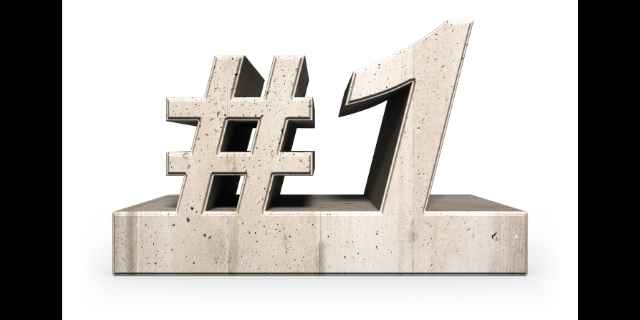
You’ve never heard of “Babe” Slater? Pull up a chair. He is from an early era but was a vital part of the development of American rugby.
That’s part of what makes him our top pick. The other part is that Slater was part of a team that won tournaments against the top European country of those times.
Not only that, the captained his team to a repeat win.
That’s why we’ve picked Babe Slater as the greatest American rugby player.
Early history
Slater was born in 1896 in California and played rugby in high school. His college didn’t offer rugby, but he was a star player in football, basketball, and baseball.
He served with the Medical Corp in the WWI and returned to farm in California. He also joined the local rugby team where he was an outstanding lock forward.
First-time Olympic gold medal winner
You probably know that the U.S. won the gold medal when rugby first appeared in the Olympics in 1920.
In truth, this was a somewhat shambolic event. Several countries pulled out of the tournament which left the entire event being decided by one match!
But Babe Slater was a member of the American team that beat France to be crowned Olympic Champions.
Leading the team through adversity in 1924
When the U.S. put together a team to go to Paris for the 2024 Olympics, the squad elected Babe Slater as captain. That’s a true measure of the respect that the player had on and off the field.
The French considered the 1920 result a complete aberration. They were the European Champions that year and fully expected to trounce all opponents.
It’s fair to say that the French authorities, press, and the public were hostile toward the U.S. for somehow “stealing” the prior Olympics.
Slater had to navigate difficult circumstances off the field. The team was delayed for 12 hours at immigration, having traveled six thousand miles by train, bus, and boat to France. Their clothes were robbed during a training session, despite French security being “present”.
When the US played Romania, the crowd booed every touch by the Americans.
But the French do recognize good rugby. The press had to praise the skills on show when the U.S. won the match.
Second-time Olympic gold medal winner and captain
Despite some recognition of American prowess, all of France expected their team to beat the United States in the final.
There is no crowd quite as hostile as a partisan Parisienne crowd, and Slater had to lead his team onto the pitch to a chorus of not just boos – but also stones and bottles thrown from the stands.
But Slater kept his team focused on the match and the U.S. were on top from the start of the match to the finish.
France managed to score one try, while the Americans ran in five. This grainy photo shows one of them.
